Share this @internewscast.com
Struggling to shed unwanted belly fat? Look no further than your eating habits. While exercise plays a crucial role in fat loss, achieving a leaner, flatter stomach hinges on a mindful approach to how and what you eat. And while there’s no magic pill or one-size-fits-all approach to losing belly fat, recognizing and addressing harmful eating habits can significantly impact your journey to a slimmer waistline.
The impact of unhealthy foods and eating habits on belly fat accumulation is profound. Foods high in refined sugars, processed ingredients, and trans fats are particularly problematic, as they are linked to increased visceral (or abdominal) fat. According to Harvard Medical School, visceral belly fat increases numerous health risks, including metabolic conditions, cardiovascular disease, type 2 diabetes, and even breast cancer and the need for gallbladder surgery in women.
To uncover the key eating habits sabotaging your waistline, we turned to Destini Moody, RDN, CSSD, LD, a registered dietitian and sports dietitian with Garage Gym Reviews. Moody reveals the 10 worst eating habits that could be hindering your progress and keeping that belly fat intact. By addressing these habits head-on, you can pave the way for a slimmer, healthier you. Read on, and when you’re finished, be sure to check out the 10 Worst Foods That Can Lead to Belly Fat.
Eating While Distracted
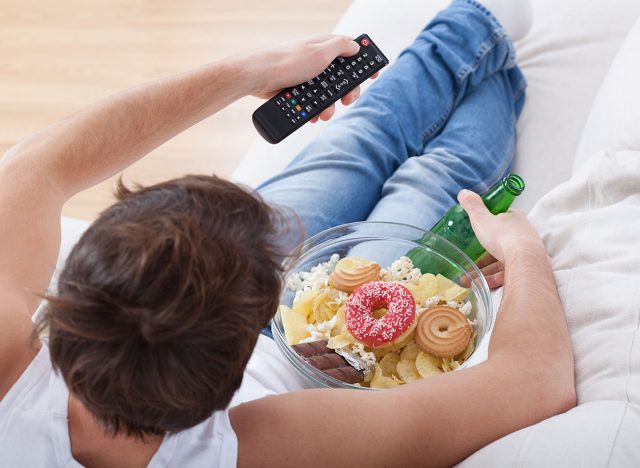
Whether watching TV or scrolling through your phone, you’re more likely to consume larger portions without realizing it when distracted. This nasty habit can lead to overeating and contribute to weight gain, particularly around the belly area. According to a study published in the Journal of Health Psychology, those who ate while watching TV or walking consumed five times more than those who had no distractions at the table while eating.
Moody tells us, “When you’re not eating mindfully, your brain may not efficiently communicate to your stomach that you’re full because you’re not concentrating on taking in food. This can cause you to eat more than you normally would, which can quickly cause an increase in belly fat.”
Drinking Too Much Alcohol
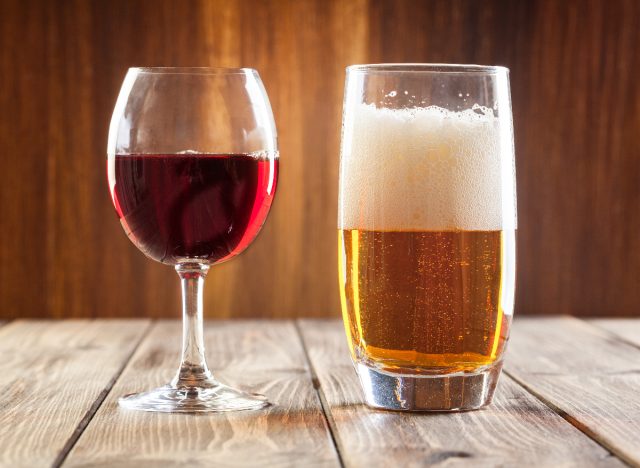
Alcoholic beverages are high in empty calories. Overconsuming them can lead to belly fat accumulation because your body prioritizes metabolizing alcohol over burning fat. “Not only does alcohol have a lot of calories, particularly wine and beer, which contain extra calories from sugar and wheat, but it can also alter your metabolism,” Moody explains. “Studies suggest that excessive alcohol consumption can alter certain hormones that help your body burn fat and control your hunger.”
Not Staying Hydrated

Dehydration can sometimes be mistaken for hunger, leading to unnecessary snacking and overeating. Make it a habit to drink water throughout the day to support your body’s functions while keeping your appetite in check. “More than half the time, we confuse thirst for hunger. This can lead to snacking or overeating when you really just need some good old H2O. So, staying hydrated can help you keep those hunger cues under control,” says Moody.
Overeating High-Calorie Healthy Foods
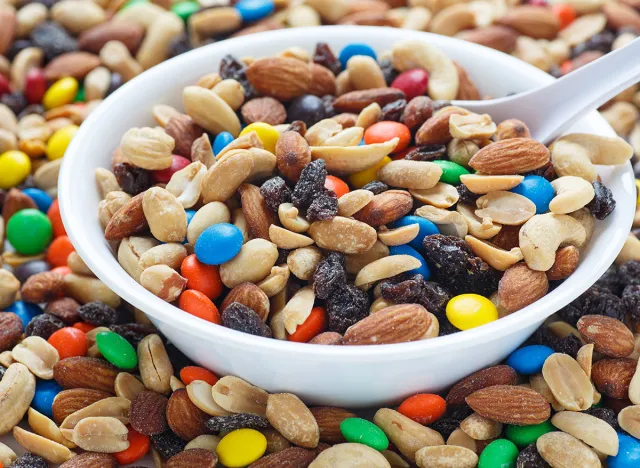
While nutritious foods are essential for a healthy diet, be mindful of your portion sizes. For example, nuts, avocados, and olive oil are nutrient-dense but high in calories. “Nuts, seeds, and avocado are wonderful sources of antioxidants, nutrients, and heart-healthy unsaturated fats. However, these foods can also have you consuming a lot of calories. About a quarter cup of walnuts contains roughly 200 calories. That’s why eating trail mix or mixed nuts right out of the bag can cause serious weight gain, even if they’re technically health-promoting foods,” says Moody.
Eating Out Too Often

Restaurant meals often contain added fats and sugars—two significant contributors to belly fat. Next time you want to dine out, consider cooking at home to give yourself more control over ingredients and portion sizes and reduce your calorie intake.
“Not only can eating out too much shrink your wallet, but it can inflate your waistline,” states Moody. “Restaurants and fast food tend to have portions that are way bigger than they should be to make you feel you’re getting your money’s worth. As well as sodium and saturated fat, these foods often contain added sugars, leading to chronic inflammation and weight gain.”
Not Eating Enough Fruits and Veggies
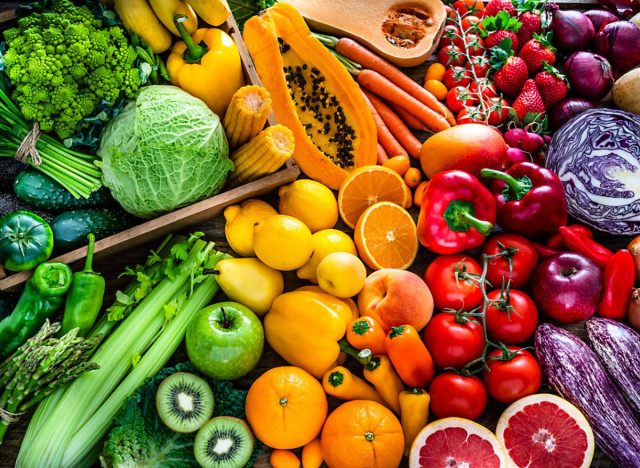
Fruits and vegetables are rich in fiber, vitamins, and minerals and are essential for a healthy, well-balanced diet. Not consuming enough of these nutrient-packed foods can cause cravings for less nutritious options. “We’ve known since high school health class that fruits and vegetables are healthy. However, they are also full of fiber and antioxidants that can help slow digestion, control hunger, and reduce chronic inflammation. Vegetables can also add bulk and volume to meals without adding a significant amount of calories, which can reduce overall calorie intake,” explains Moody.
Skipping Meals
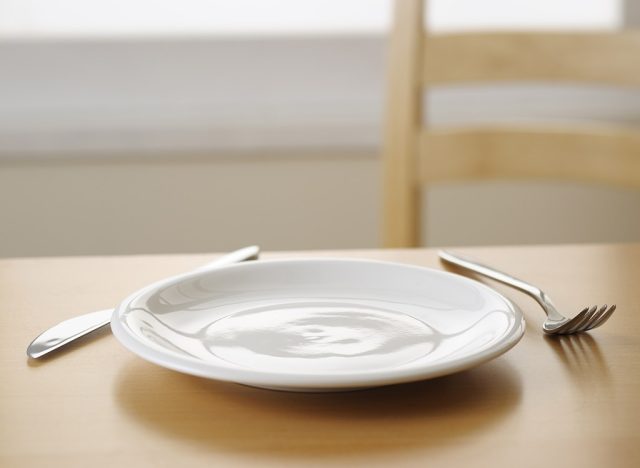
According to the University of Louisville, skipping meals can disrupt your metabolism and lead to overeating later in the day. Fortunately, planning and preparing meals in advance can help you stay on track with your weight loss goals and maintain a consistent eating schedule.
“The problem with skipping meals is that your body’s hunger hormones like to make up for lost time later on,” says Moody. “If you’ve ever skipped breakfast and experienced that familiar hunger pang in the late afternoon, you’ve probably experienced this effect. This imbalance can cause excessive snacking, especially late at night.”
Not Eating Enough Protein
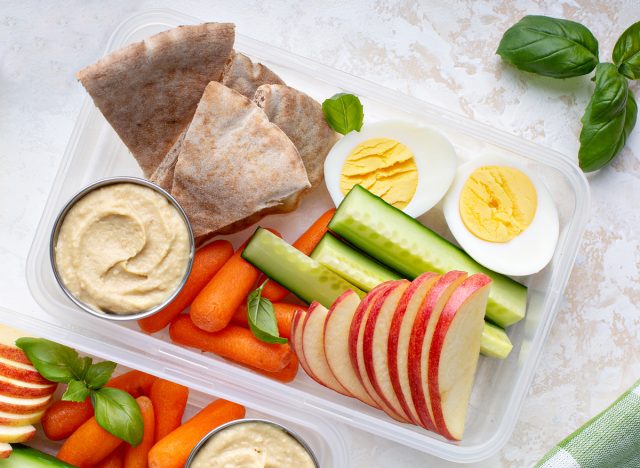
Protein is the most satiating macronutrient, and not consuming enough of it can spike cravings for unhealthy snacks that contribute to belly fat. “Not only can protein cause an increased feeling of fullness, allowing you to eat less during meals, but protein can help maintain muscle mass. Increased muscle mass can translate to a faster metabolism, meaning you burn more calories at rest. Additionally, digesting protein burns more calories than digesting carbohydrates or fat,” explains Moody.
Relying on Supplements
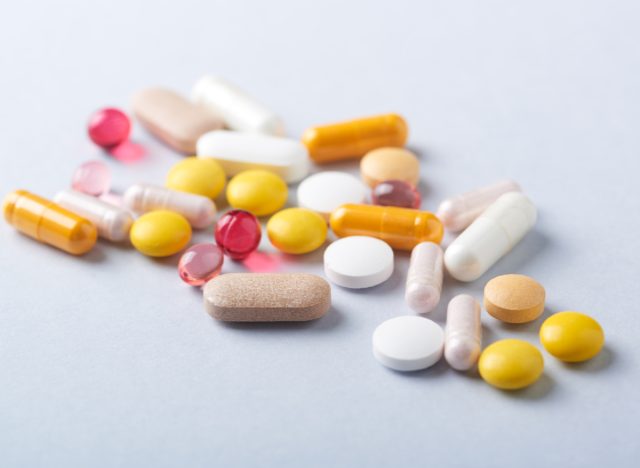
While supplements can be beneficial, relying solely on them for nutrition is not a sustainable or practical approach. Instead, use them as the name suggests—to supplement an existing healthy diet. “Having a morning greens powder instead of veggies or taking a multivitamin instead of cleaning up your diet isn’t the way to go,” advises Moody. “Eating healthy foods gives you phytonutrients and fiber you can’t get from your daily supplements, and you need these components to control belly fat and inflammation levels. It’s important to be careful to eat whole foods for health and weight management and use supplements to fill in the gaps, rather than the other way around.”
Mindless Snacking

Grazing on snacks throughout the day without paying attention to portion sizes and nutritional content can lead to consuming way too many calories. To promote mindful eating, Harvard T.H. Chan School of Public Health recommends having structured meals and snacks, savoring each bite, and being aware of your body’s hunger and fullness cues. These strategies can help you make more conscious choices, maintain a healthier balance in your diet, and keep belly fat at bay.













